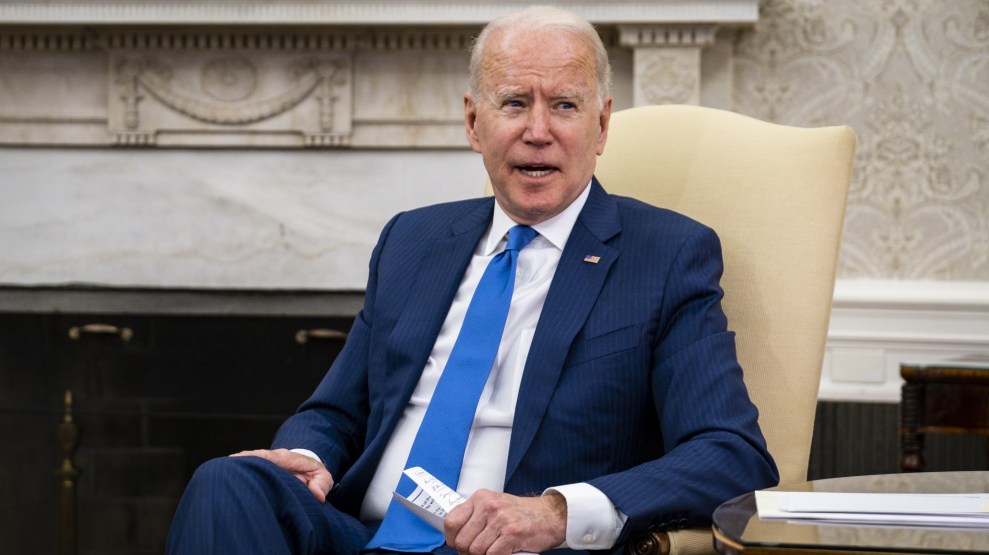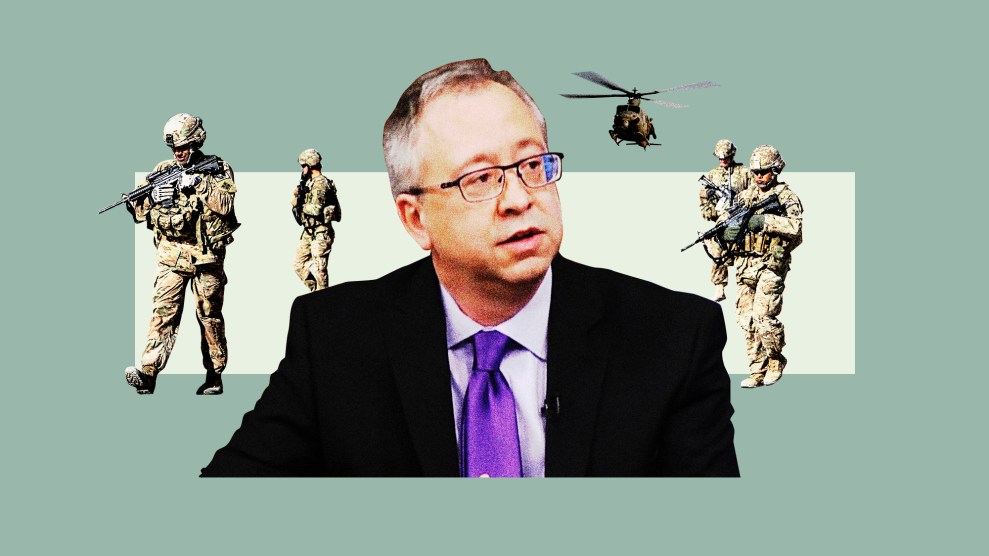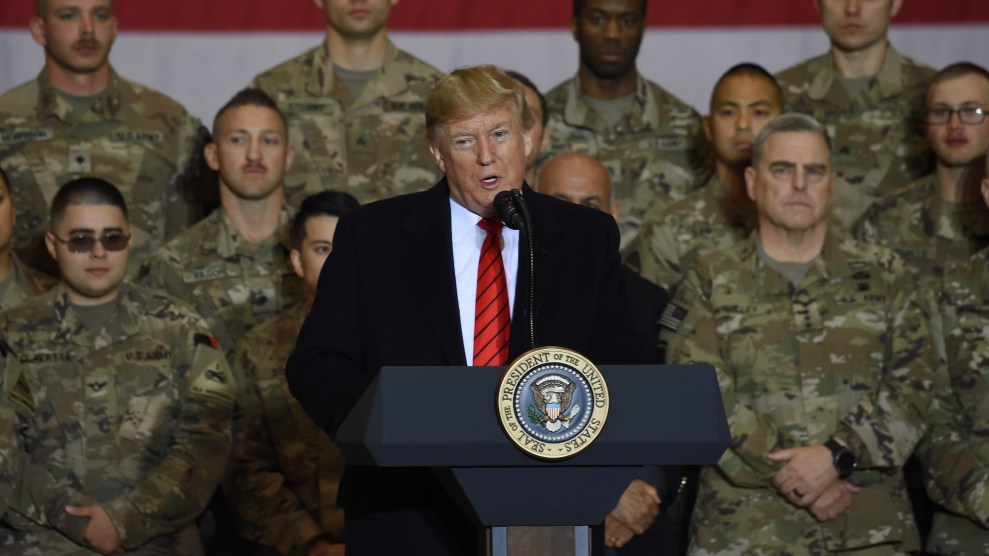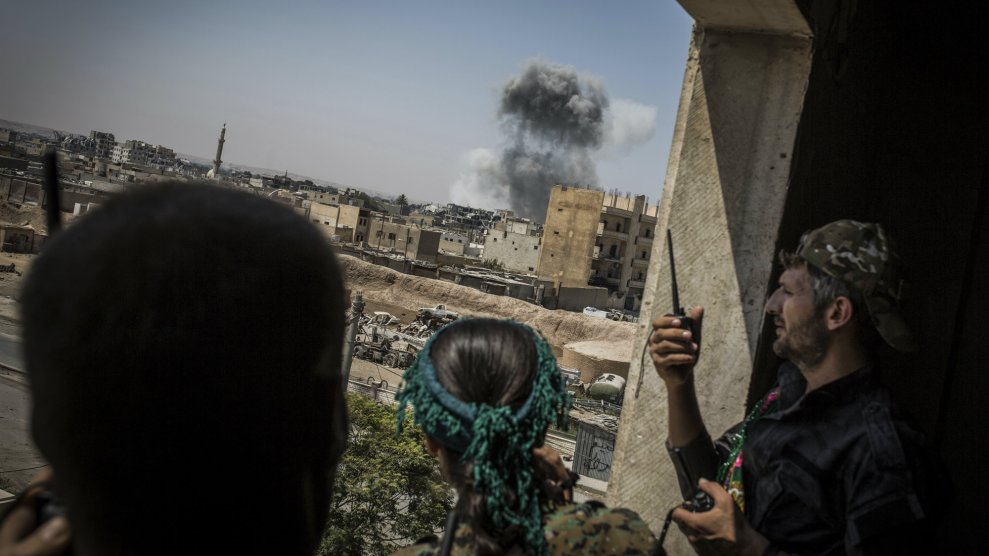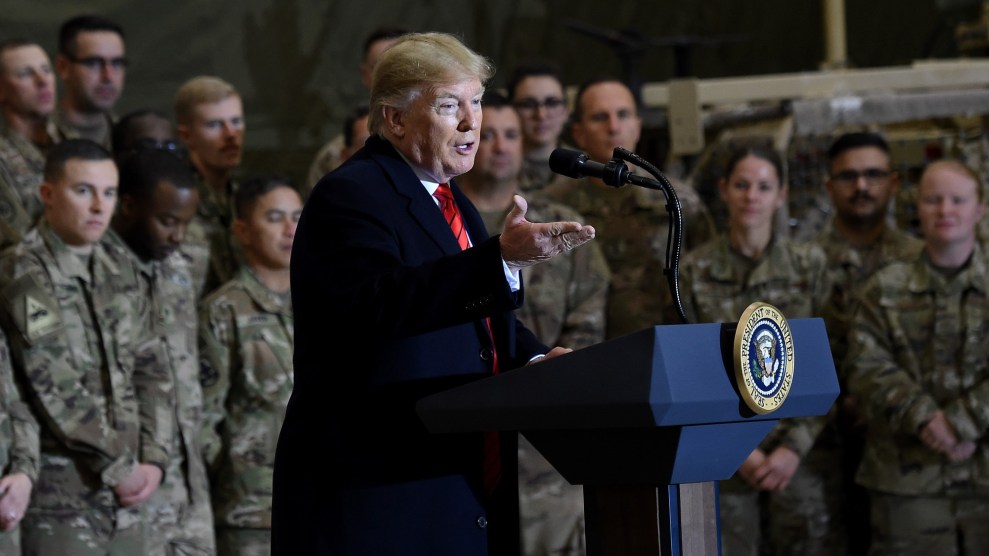
Olivier Douliery/AFP/Getty
Spencer Ackerman has had as interesting—and tempestuous—a relationship to national security reporting as anyone in the field. In his nearly two decades on the beat, Ackerman exposed Islamophobic training sessions at the FBI, won a Pulitzer Prize as part of the team reporting on Edward Snowden’s leaks for the Guardian, and, most recently, covered the reverberating impact of the war on terror for the Daily Beast.
Now he writes a Substack called “Forever Wars,” which he describes as a way to “chronicle, investigate and interrogate the continuities, departures and permutations of the War on Terror.” The twice-weekly newsletter is a gateway into the same themes that animate Ackerman’s book, Reign of Terror: How the 9/11 Era Destabilized America and Produced Trump, which was released Tuesday.
Beginning with the Oklahoma City bombing and the white nationalist roots of Timothy McVeigh and continuing through September 11 and the wars in Afghanistan and Iraq, Ackerman argues that the war on terror’s animating feature is an “aggrieved, vindictive” kind of nativism that found its ultimate champion in Donald Trump.
Ackerman’s book returns frequently to the victims of the war on terror, whose names he urges us to say even when the military (by routinely undercounting civilian casualties) has denied them personhood. The most memorable passages in it involve Adham Hassoun, a Lebanese-born Palestinian man whose interminable detention within a maze of United States security facilities serves as an unquestionable reminder of the brutality—and Kafkaesque senselessness—of the war on terror.
Last week, I called Ackerman to discuss his writing process, Joe Biden’s withdrawal from Afghanistan, Trump’s foreign policy, and our shared passion for the X-Men.
The book had been planned for May but got delayed because of COVID. As you saw what happened after the presidential election, culminating in the January 6 insurrection, did you know you had to make some late additions to the book?
I had no idea how this book was going to end and that caused me no end of anxiety. The initial manuscript was due in September, so as I wrote the first draft and got it to the publisher, I ended it with the summer uprisings, the backlash to BLM, Trump and [Attorney General William] Barr declaring that antifa were domestic terrorists, that Black Lives Matter were terrorists, and kind of ended it there, simply because that was when the book was due.
These things take a very long time to be edited and reach their finish point. And before we knew it, we were still working on editing the book, and then January happened. So once January 6 happened, I contacted my editor. I was like, I have to redo the entire last chapter. This is the right place to end the book. This is an astonishing real-time vindication, I would argue, of the thesis of the book.
Especially given that the book starts with Oklahoma City and not with 9/11, I thought this was fate telling me the book had to end on January 6.
You got right to my next question, which was about choosing to start the book with Timothy McVeigh and the Oklahoma City bombing and not with 9/11. I’m curious why you made that decision.
We see during the response to Oklahoma City a very different approach by the United States to a terrorist attack that comes from white people. And what we learn from that is that these expansive definitions of culpability, these treatments of associations based on ideological or religious affinity, being immediately understood as an over-broad, unjust, and unconstitutional mechanism of addressing terrorism when applied to white people.
I was 15 when Oklahoma City happened, so I didn’t read a lot of contemporary journalism around it. Going back and reading it was a haunting experience because we see the way in which important political figures and media figures refuse to call this an act of terror.
It was described as more of an anti-government or anti-authority action.
That’s right. And when you read through the accounts, even the ones that focus specifically on McVeigh, they labor extensively to either diminish his really vocal and aggressive white supremacy, to disconnect it from any history of white supremacist violence.
There’s a Washington Post story that talks about McVeigh as a child of the divorce revolution, whose affinity for guns is an attempt to fill the void left by his absent mother, that you just never see with terrorists who aren’t white.
The prosecution of McVeigh is not interested in going beyond the immediate plot and looking at the white supremacist infrastructure in the country. And one of the things we’ve heard throughout the 9/11 era, I can tell you as someone who spent his adult life covering the Pentagon, how often you heard from important security figures and the politicians that share their worldview that, say, Pakistan has to do much more to crack down on the terrorist infrastructure inside of its borders. Well, there’s a fucking terrorist training camp in northeastern Oklahoma.
Let’s talk about Trump for a moment. He was often described as an anti-interventionist and certainly his criticisms of the wars in Afghanistan and Iraq were a big part of the campaign. Maureen Dowd even called him “Donald the Dove” in a column.
God bless her.
But that is certainly not how you view Trump. Why do you think this view of him is wrong?
Donald Trump is not an opponent of the war on terror at all. Donald Trump is the lagging indicator of the war on terror. All of the nativist politics that the war on terror promotes while pretending it does nothing of the sort, all of the righteous violence against nonwhite people that it institutionalizes—all of these things become part of American life at the dawn of the 21st century, after 9/11, and they’re lying in wait for someone to come to terms on the right with the fact that the wars themselves are obvious failures.
This condition of being at neither peace nor victory, where you don’t get normalcy, you don’t get a return to the pre-9/11 status quo, you don’t get the satisfaction of having these things done, let alone done on American terms. You only get this constant reminder of humiliation from people whom the right and its media organs—with more euphemistic language echoed in mainstream media and even liberal media—treat as subhuman. Somehow these guys beat the United States, and that, for people who really subscribe to the nativist conceptions of American exceptionalism, is simply an intolerable thing.
If the war on terror is a car, the car itself is a weapon, but the engine inside it, the thing that powers the car, this nativism, this aggrieved, vindictive patriotism, this bloodthirst and its a deep willingness to see itself as a counterterrorist, as an avenger of these unacceptable, anti-civilized acts, that’s a powerful engine. It can be repurposed and it can keep running.
The older, extant Republican consensus just has no answer to this. Their answer echoes the ones that liberals pursue. It’s that this is an awful deviation—what Trump is pursuing is dangerous, and it’s unfamiliar. Well, in fact it’s deeply familiar.
That’s the convenient “Never Trump” formulation—that he is a deviation from traditional Republican ethics and not a culmination of them.
Exactly. Throughout the early phase of the Trump administration, we saw an endless number of explanations for how the the Trump phenomenon happens. Some of them are very good, and I consider compelling, particularly the ones that are more deeply, historically rooted. But all of them excluded the fact that, for the past 20 years, the United States had experienced this condition of relentless, endless, deeply frustrating, humiliating violence in the name of reasserting its strength, but only showing its weakness.
And the elites who charged the United States into that breach move on without consequence. If you’re one of those people who believe what your leaders told you, and what your media figures reinforced and justified, and you see the disconnection between the reality that they also for many, many years deny, and I would argue, continue to deny, particularly as it concerns its impact on real people with names and souls. None of this makes much sense. And Trump offers this extremely palliative explanation: Your leaders were lying to you, they don’t know what the fuck they’re doing, they will never know what they’re doing. You have to show only strength and you have to recognize that we are in civilizational struggle and that struggle isn’t just a struggle against ISIS. It’s also a struggle to keep America’s traditional identities and racial caste and economic status quo. In fact, the war on terror doesn’t just happen in Baghdad. It happens on the southern border.
Even when Trump was the one commandeering it, you didn’t see the kind of opposition from Democrats that would have reduced the president’s power of surveillance and other tools of the security state.
This is one of the reasons I try to set the book up as not a two-player game, but more of a three-player one, where the forces are the right, liberals, and the security state. And you can’t really understand the shifts, both politically and operationally in the war, without looking at it from the perspective of the interplay of those three forces, even though you see in the media constantly a flattening of it.
Through it, you can see how leading Democratic figures view themselves. And this happened during the Bush administration as well: the saviors of a beleaguered security state, which is under assault from the depredations of a right wing that shows no interest in what what a wise policy would look like. And the heroes of the liberal #Resistance during the Trump administration, many of them are people who built the war on terror: Bob Mueller, Michael Hayden, John Brennan.
I was struck by how the CIA officials you return to frequently in the story stay the same. Someone like Gina Haspel is there from the beginning of the war on terror on through the Trump years. What does that say about our reluctance to deal with the consequences of what these people did? In some cases, folks like Brennan and Hayden became almost lionized in the Trump era.
I would—not to put too fine a point on it—argue that it’s grotesque. Hayden commits a crime against the constitution that has, I believe, destroyed the Fourth Amendment, quite possibly forever, and lies about it relentlessly, and then goes on to run the CIA. There’s an entire appendix of the 2014 Senate Intelligence Committee torture report that’s just about the lies Hayden told the committee on one single day of testimony. Is this your king?
It just felt like the weight and the judgment of history had escaped these people. And I’m Jesse Pinkman [from Breaking Bad] screaming, “He can’t keep getting away with it!”
I would argue that Adham Hassoun is in many ways the conscience of your book. What do you think his story can tell us about the war on terror writ large?
It is very important to me that a reader of Reign of Terror comes away knowing the name Adham Hassoun. He’s a Palestinian refugee who comes to the United States in the 1990s after experiencing an extremely violent and traumatic childhood in the Lebanese civil war. He comes to live in Florida and the war on terror criminalized him.
Starting after Oklahoma City and then supercharged by the Patriot Act, American law enforcement and its surveillance apparatus undergo a really radical shift. It creates much broader categories with much broader punitive responses to the concept of “association.” It used to be the case that terrorism charges against people were about acts of violence that specific people committed. In the wake of Oklahoma City, a law gets passed—called the Antiterrorism and Effective Death Penalty Act—that chops all of that out.
The law conceived of banned terrorist organizations as a foreign terrorist organization, i.e. nonwhite, i.e. Muslim, even though the impetus for this law is Timothy fucking McVeigh, which I think really tells you a lot about who American counterterrorism is for and who it is not for.
The Patriot Act expands investigative powers to go after people who do things like donate money to now-banned charities and then creates greater sentences for people who, perhaps even inadvertently, are caught up in this web of association. In late 2001, there’s this extremely controversial—and then forgotten because it isn’t applied for so long—provision that is just breathtaking in scope. It says if you are a non-deportable noncitizen, which is to say a stateless person inside the United States, and you’re caught in this web of criminal association, then you can be detained indefinitely. This is American law right now. It’s called section 412 of the Patriot Act.
Adham Hassoun in the 1990s has the misfortune of trying to help out a guy who attends the same mosque he does.
This is José Padilla, right?
That’s right. This guy converts to Islam, and as Adham puts it, doesn’t really have his life together. But that’s what communities of faith try to do: get people on track. Adham is like, Go see this guy in Egypt, he can get you a job, he can find you a woman to marry. Eventually [Padilla] is accused of trying to set off a radiological device inside the United States, but they dropped these charges because they were bullshit. Very soon after that happens, the FBI and immigration come for Adham Hassoun.
He spends the next several years in immigration lockups and then federal pretrial detention, in which his interactions with the authorities are not really about Padilla. They were about trying to get him to become an informant, which is something the FBI does again and again. Because he won’t become an informant and spy in mosques and more broadly throughout his community, eventually they find something to charge him with.
He is José’s co-defendant at a point, and once you are the co-defendant of the guy who’s shorthanded the “Dirty Bomber,” you ain’t getting off. This is such a forgone conviction. The judge during that sentence has to recognize—and it’s an amazing thing to read in the in the court filings—that the government is trying to send this guy to basically the rest of his life in prison when, by their own admission, they can’t connect him to any act of violence. They can’t connect him even indirectly to a bomb getting set off. The legacy of the Patriot Act, as it is visited upon Adham Hassoun, is that none of this is necessary.
Adham, once he actually serves the debt that America imposes on him, it’s October of 2017, and now it’s Trump time. And he gets out of prison, but not out of a cage. Because he is this non-deportable noncitizen, he is instead sent not to a different country, [but] to an ICE detention facility in upstate New York.
Ultimately, there is a long legal challenge that the ACLU and some heroic local attorneys in Buffalo pursue. And the result of this seems to be getting closer and closer to the day where he can actually get out of a cage. At an evidentiary hearing, the government basically loses because it cannot substantiate its claims that Adham is dangerous. The judge in this case points to prosecutorial and FBI misconduct. And the government, without conceding the power it is exercising here, just says this guy we’ve been saying is real dangerous, he can go to Rwanda. And now, Adham lives in Rwanda.
He sends me funny TikToks. He is enjoying life, finally outside of the cage after 18 years. And he hasn’t hurt anybody. He says things about the American people that speak to a generosity of the soul that I, in particular, do not possess.
I thought this was one of the most striking parts of the book. What exactly does he say?
He says America, as a series of institutions, is in a lot of trouble, but “still considers the American people to be my people.” One of the first things that he experiences after coming to America is the devastation of Hurricane Andrew in 1992 in Florida and he sees communities coming together to help one another and rebuild. These people are just like he knows from back home. And he gets really comfortable there and thinks that he has found a home. And after 9/11, people were talking to him and [warning] that the backlash is coming. He knows there’s gonna be some backlash, but asks, “Can it really be that bad?” And 18 years later, Adham had his answer.
Where would you situate Biden’s decision to withdraw from Afghanistan and the political backlash within the context of the war on terror?
Withdrawal from Afghanistan has a million caveats and asterisks to it, which is a pattern of behavior we’ve seen throughout the war on terror. “Ending” a war on one of the forever battlefields is always in scare quotes. When you listen to what the generals say, when they testify, what Secretary of Defense Lloyd Austin says in his press conferences, they’re really clear that whenever they feel necessary, they will bomb Afghanistan. They still feel a political obligation to the Afghan government that the United States installed after 9/11.
This reminds me of the way in which Obama withdraws from Iraq but similarly leaves something like 5,500 private contractors, security contractors, and an extensive apparatus of security around the US Embassy.
It’s never a complete withdrawal.
That’s right. It’s always a step down with an option of reescalation as necessary. So I think it is on Biden to demonstrate that this will actually be an end to the war. If the Taliban takes over Afghanistan, which I think is more likely than not, what is the United States prepared to not do? Is it actually prepared to come to a sort of modus vivendi with the Taliban? I don’t see much of a constituency among the public for returning to war in Afghanistan, but a real un-ignorable lesson of the past 20 years and, before that, of Cold War anti-communism is that the security functions of the United States government are not remotely meaningfully democratic.
I can’t leave without asking you about the X-Men. [And, rest assured, this conversation went on for much longer! But we’ll spare non-nerds the details.] You are probably the world’s preeminent Magneto defender—at least on my Twitter feed—and I think even the most passionate among us would not have defended Magneto quite like you did on the Cerebro podcast. The age-old comparison of him to someone like Malcom X is a bit trite, but I’m curious who you would more readily compare to Magneto.
The way I think about Magneto is not the way I think people ought to think about actual political figures. I view Magneto as literature. We’re talking about a mechanism for certain aspirations about liberation, justice, vengeance, and ultimately community that he represents throughout his character history. This guy is a mass murderer. I don’t really want to say that a political figure I think is brave is Magneto, you know? If I compared someone to Magneto, that’s not going to go well for them. So, probably, no one alive.
Historically, who is Magneto? Although the liberation elements obviously don’t apply—that’s a hard element of Magneto to lose—but Mehmed the Conqueror, the guy who in 1453 takes Constantinople for the Ottoman Empire and decisively ends the Roman Empire. Whenever you want to argue the Roman Empire ended or what the Roman Empire was or became, there’s a lot of different ways to do that. But one indisputable date is that there is no Eastern Roman Empire after 1453. So, maybe him.
This interview has been edited for length and clarity.

